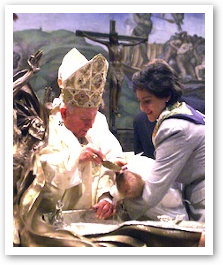 This week the Vatican released the 2011 Lenten Message of Pope Benedict XVI. The message’s title is taken from St. Paul: “You were buried with Him in Baptism, in which you were also raised with Him” (Colossians 2:12).
This week the Vatican released the 2011 Lenten Message of Pope Benedict XVI. The message’s title is taken from St. Paul: “You were buried with Him in Baptism, in which you were also raised with Him” (Colossians 2:12).
The message in its entirety may be viewed here. (Scroll down for the English translation.)
As the title suggests, this year’s focus is on the relationship between Baptism and Lent. The Holy Father writes:
“The fact that, in most cases, Baptism is received in infancy highlights how it is a gift of God: no one earns eternal life through their own efforts. The mercy of God, which cancels sin and, at the same time, allows us to experience in our lives ‘the mind of Christ Jesus,’ is given to men and women freely. . . .
“Hence, Baptism is not a rite from the past, but the encounter with Christ, which informs the entire existence of the baptized, imparting divine life and calling for sincere conversion; initiated and supported by Grace, it permits the baptised to reach the adult stature of Christ.
“A particular connection binds Baptism to Lent as the favorable time to experience this saving Grace. . . . In fact, the Church has always associated the Easter Vigil with the celebration of Baptism. . . . This free gift must always be rekindled in each one of us, and Lent offers us a path like that of the catechumenate, which, for the Christians of the early Church, just as for catechumens today, is an irreplaceable school of faith and Christian life. Truly, they live their Baptism as an act that shapes their entire existence.”
[This certainly relates in a particular way to those who have embraced the vocation to consecrated life, see CCC 916.]
The Holy Father calls the Christian faithful to the traditional practices of fasting, almsgiving, and prayer, and to be “guided by the Word of God”:
“By immersing ourselves into the death and resurrection of Christ through the Sacrament of Baptism, we are moved to free our hearts every day from the burden of material things, from a self-centered relationship with the ‘world’ that impoverishes us and prevents us from being available and open to God and our neighbor. . . . Through the traditional practices of fasting, almsgiving and prayer, which are an expression of our commitment to conversion, Lent teaches us how to live the love of Christ in an ever more radical way.
“Fasting, which can have various motivations, takes on a profoundly religious significance for the Christian: by rendering our table poorer, we learn to overcome selfishness in order to live in the logic of gift and love; by bearing some form of deprivation–and not just what is in excess–we learn to look away from our ‘ego,’ to discover Someone close to us and to recognize God in the face of so many brothers and sisters. For Christians, fasting, far from being depressing, opens us ever more to God and to the needs of others, thus allowing love of God to become also love of our neighbor.
“In our journey, we are often faced with the temptation of accumulating and love of money that undermine God’s primacy in our lives. The greed of possession leads to violence, exploitation, and death; for this, the Church, especially during the Lenten period, reminds us to practice almsgiving, which is the capacity to share. The idolatry of goods, on the other hand, not only causes us to drift away from others, but divests man, making him unhappy, deceiving him, deluding him without fulfilling its promises, since it puts materialistic goods in the place of God, the only source of life. . . . The practice of almsgiving is a reminder of God’s primacy and turns our attention towards others, so that we may rediscover how good our Father is, and receive His mercy.
“During the entire Lenten period, the Church offers us God’s Word with particular abundance. By meditating and internalizing the Word in order to live it every day, we learn a precious and irreplaceable form of prayer. . . . Prayer also allows us to gain a new concept of time: without the perspective of eternity and transcendence, in fact, time simply directs our steps towards a horizon without a future. Instead, when we pray, we find time for God, to understand that His ‘words will not pass away,’ to enter into that intimate communion with Him ‘that no one shall take from you,’ opening us to the hope that does not disappoint, eternal life.”